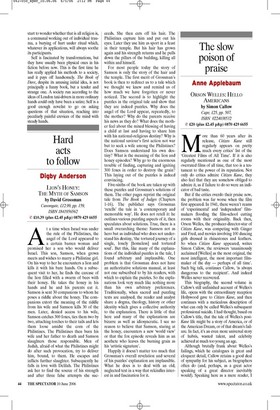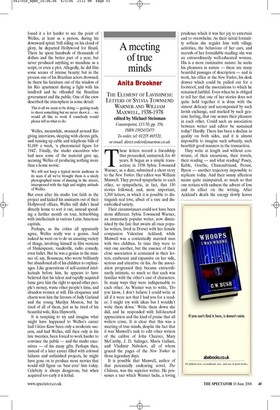The slow poison of praise
Anne Applebaum
ORSON WELLES: HELLO AMERICANS by Simon Callow Cape, £25, pp. 507, ISBN 0224038532 ✆ £20 (plus £2.45 p&p) 0870 429 6655 More than 60 years after its release, Citizen Kane still regularly appears on pretty much every critics’ list of the ‘Greatest Films of All Time’. If it is also regularly mentioned as one of the most overrated films of all time, that too is a testament to the power of its reputation. Not only do critics admire Citizen Kane, they also feel that they are somehow obliged to admire it, as if failure to do so were an indicator of bad taste.
But if the critics overdo their praise now, the problem was far worse when the film first appeared. In 1941, there weren’t reams of ‘experimental’ and ‘independent’ filmmakers flooding the film-school cutting rooms with their originality. Back then, Orson Welles, the producer-director-star of Citizen Kane, was competing with Ginger and Fred, and movies involving 100 dancing girls dressed in rhinestones and feathers. So when Citizen Kane appeared, writes Simon Callow, the reviewers ‘unanimously acclaimed [Welles] as the most original, the most intelligent, the most important filmmaker of the day — perhaps of all time’. Such big talk, continues Callow, ‘is always dangerous to the recipient’. And indeed Welles never recovered.
This biography, the second volume in Callow’s still unfinished account of Welles’s life, opens with the extraordinary reception Hollywood gave to Citizen Kane, and then continues with a meticulous description of what can only be called Welles’s subsequent professional suicide. I had thought, based on Callow’s title, that the tale of Welles’s postKane life might be a story of America, or of the American Dream, or of that dream’s failure. In fact, it’s an even more universal story of hubris, wasted talent, and celebrity achieved at much too young an age.
Although brutally frank about Welles’s failings, which he catalogues in great and eloquent detail, Callow retains a good deal of sympathy for his subject, as biographers often do (and, perhaps, as a great actor speaking of a great director inevitably would). Speaking here as a mere reader, I found it a lot harder to see the point of Welles, at least as a person, during his downward spiral. Still riding on his cloud of glory, he departed Hollywood for Brazil. There he spent hundreds of thousands of dollars and the better part of a year, but never produced anything so mundane as a script, or even a plot. Allegedly, he did film some scenes of intense beauty; but in the process one of his Brazilian actors drowned, he threw his furniture out of the window of his Rio apartment during a fight with his landlord and he offended the Brazilian government and the public. One of the crew described the atmosphere in some detail:
This is all we seem to be doing — getting ready to shoot something but we never shoot it ... we would all like to work if somebody would please tell us what to do.
Welles, meanwhile, swanned around Rio giving interviews, sleeping with chorus girls, and running up cable and telephone bills of $1,000 a week, ‘a phenomenal figure for 1942’. Finally, the studio executives who had seen some of the material gave up, accusing Welles of producing nothing more than a home movie:
We will not keep a typical movie audience in its seats if all we’ve brought them is a nicely photographed scene of dancing in the streets, interspersed with the high and mighty attitude of Welles.
But even after his studio lost faith in the project and kicked his assistants out of their Hollywood offices, Welles still didn’t head directly home to sort it out, instead spending a further month on tour, hobnobbing with intellectuals in various Latin American capitals.
Perhaps, as the critics all apparently agree, Welles really was a genius. And indeed he went on to do an amazing variety of things, involving himself in film versions of Shakespeare, vaudeville, radio comedy, even ballet. But he was a genius in the manner of, say, Rousseau, who wrote brilliantly but abandoned all of his children to orphanages. Like generations of self-centred intellectuals before him, he appears to have believed that his talent and rapidly acquired fame gave him the right to spend other people’s money, waste other people’s time, and abandon women at will. His eloquence and charm won him the favours of Judy Garland and the young Marilyn Monroe, but he tired of all of them, just as he tired of his beautiful wife, Rita Hayworth.
It is tempting to try and imagine what might have happened to Welles’s career had Citizen Kane been only a moderate success, and had Welles, still then only in his late twenties, been forced to work harder to convince the public — and the studio executives — of his many gifts. Perhaps then, instead of a later career filled with colossal failures and unfinished projects, he might have gone on to produce more movies that would still figure on ‘best ever’ lists today. Celebrity is always dangerous, but when acquired too early it is lethal.



















































































 Previous page
Previous page